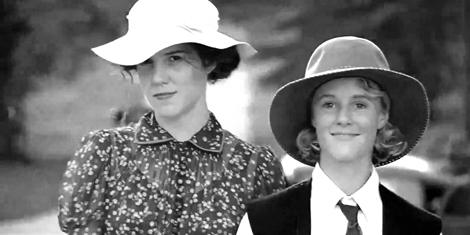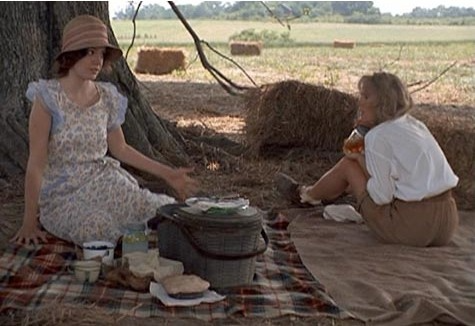
Fried Green Tomatoes isn’t just a story — it’s a tapestry of unforgettable characters stitched together by love, resilience, and defiance. Each character plays a unique role in delivering the film’s rich emotional impact and timeless themes. Let’s take a closer look at the central figures who make this Southern tale so powerful.
Idgie Threadgoode – The Wild Spirit with a Fierce Heart
Idgie Threadgoode is the soul of Whistle Stop. Bold, rebellious, and unapologetically herself, Idgie (played brilliantly by Mary Stuart Masterson) defies every expectation placed on women in the conservative South of the 1920s.
From a young age, Idgie rejects traditional femininity. She dresses like a boy, drinks, gambles, speaks her mind, and befriends people of all races and classes — all of which set her apart from her community. But beneath her tough exterior lies a deep well of compassion. She loves fiercely and protects those she cares about with unwavering loyalty.
Her bond with Ruth Jamison is the emotional core of the film. Though never explicitly stated, their relationship is heavily coded as romantic. Idgie’s devotion to Ruth — from helping her escape an abusive marriage to raising a child together — is nothing short of profound.
Idgie represents freedom: the freedom to live, love, and fight for what’s right — even when society says no.
Ruth Jamison – The Gentle Strength Beneath the Surface
Ruth (played by Mary-Louise Parker) is the perfect counterbalance to Idgie. She’s soft-spoken, graceful, and deeply religious. At first, she seems fragile — the kind of woman molded by society to be quiet and obedient. But as the story unfolds, we witness her inner strength emerge.
Trapped in an abusive marriage with Frank Bennett, Ruth makes the courageous decision to leave — a rare act of defiance in her time. With Idgie’s help, she escapes and begins a new life at the Whistle Stop Café, where she finds purpose, joy, and unconditional love.
Ruth is a quiet revolutionary. She doesn’t shout or fight like Idgie, but her choices — leaving Frank, raising Buddy Jr., and building a life with Idgie — are just as radical and empowering. Her love story with Idgie may be subtle, but it’s also deeply moving.
Evelyn Couch – The Woman Who Finds Herself
In the 1980s timeline, Evelyn (played with warmth and humor by Kathy Bates) is the everyday woman many viewers relate to most. She’s middle-aged, ignored by her husband, unhappy with her body, and unsure of her place in the world.
But her friendship with Ninny Threadgoode awakens something inside her. As she listens to the stories of Idgie and Ruth, Evelyn begins to transform. She gains confidence, starts standing up for herself, and reclaims her life with joyful defiance — most famously screaming “Towanda!” as she smashes a car in a parking lot.
Evelyn’s journey is one of reawakening. She learns that it’s never too late to change, to take risks, and to live boldly. Her growth is inspiring, funny, and deeply satisfying.
Ninny Threadgoode – The Storyteller with Spark
Ninny, played by the legendary Jessica Tandy, is the heart of the film’s framing story. At first glance, she’s just a sweet old lady telling tales in a nursing home. But as her stories unravel, we realize she’s far more than that — she’s the thread that binds past and present, life and legacy.
Her storytelling not only brings Whistle Stop to life but also breathes life back into Evelyn. Through Ninny, we explore themes of memory, aging, identity, and the power of storytelling itself.
There’s also a popular fan theory that Ninny is actually Idgie in her old age, choosing to keep her identity hidden but passing on her story through a different name. Whether true or not, the ambiguity adds a beautiful layer of mystery and magic to her character.

Sipsey – The Quiet Protector
Sipsey (played by Cicely Tyson) is a Black woman who works for the Threadgoode family and later helps run the Whistle Stop Café. Though her role may seem secondary at first, Sipsey becomes vital to the plot — particularly in the film’s dark twist involving Frank Bennett’s disappearance.
When Frank tries to kidnap Ruth’s baby, Sipsey protects the child by killing Frank. It’s a moment of fierce maternal instinct, and it reveals just how many women in this story are willing to do whatever it takes to protect each other.
Sipsey’s quiet presence hides a deep reservoir of wisdom, strength, and sacrifice — a tribute to the many women of color whose contributions are often overlooked in historical narratives.
Frank Bennett – The Face of Violence and Control
Frank Bennett, Ruth’s abusive husband, is the film’s clearest antagonist. He represents toxic masculinity and the systems that trap women in cycles of violence. His brutal treatment of Ruth and his attempt to steal their child are both chilling and tragically realistic.
His death — and the mystery surrounding it — becomes a symbol of justice outside the law. While his fate is handled with a touch of Southern Gothic humor (yes, the BBQ), it also speaks to the deep desperation that often fuels acts of resistance in oppressed communities.
Buddy Threadgoode – The Tragic Catalyst
Though he dies young, Buddy (played by Chris O’Donnell) leaves a lasting impact. As Idgie’s older brother, he’s the first person to truly see and celebrate her wildness. His death in a train accident is a pivotal moment in her life, pushing her further into isolation — and later motivating her bond with Ruth.
Buddy represents innocence, acceptance, and the lost potential of a kinder world. His absence is felt long after he’s gone.
A Cast of Courage and Heart
What makes Fried Green Tomatoes so unforgettable isn’t just the plot — it’s the characters. Each one is a fully realized human being with their own fears, hopes, and arc of transformation. Together, they paint a portrait of Southern life that is both specific and universal, touching on race, gender, identity, and the enduring power of love.
Whether it’s Idgie’s fire, Ruth’s quiet bravery, Evelyn’s awakening, or Ninny’s sparkling wisdom — these characters don’t just tell a story. They live it. And through them, we learn that no matter who you are or where you come from, you have the power to change your life and leave a legacy of love behind.
